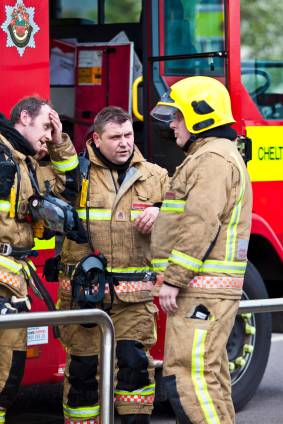By Dr Fehmidah Munir, Dr Stacy Clemes, Dr Jonathan Houdmont, and Dr Ray Randall
Firefighters are expected to maintain high levels of physical fitness in order to safely perform their required duties.? However, many firefighters struggle to maintain fitness levels and have problems with being overweight or obese.? Obesity can have a significant impact on health, including an increased risk of cardiovascular heart disease, which is a leading cause of fatalities among firefighters.? Obesity also negatively impacts on work productivity and there is concern that obesity may endanger firefighters? abilities to protect the safety and well-being of the public they are serving as well as their own safety, health and well-being.
There is currently no statutory requirement for fitness testing in UK firefighters. Policy is varied among UK fire and rescue services, with each working independently to assess its own needs and requirements.? Some services have fitness advisors and annual fitness tests, while others have no fitness policy, placing responsibility on the firefighter to turn up for work fit for the role.
 In a recent paper, we examined the prevalence of obesity among over 700 UK firefighters from a fire and rescue service to assess whether it is a cause for concern. The study compared their weight, BMI, body fat percentage ?and waist size measurements in 2008 and 2011.
In a recent paper, we examined the prevalence of obesity among over 700 UK firefighters from a fire and rescue service to assess whether it is a cause for concern. The study compared their weight, BMI, body fat percentage ?and waist size measurements in 2008 and 2011.
In 2008, 35% of the firefighters were classified as normal weight, 54% were overweight and 11% were obese.? When compared to nationally represented data from the Health Survey for England in 2008, a greater proportion of these firefighters were considered as overweight (54%, versus 42%of the general male population); however, fewer firefighters were classified as obese (11% versus 24%).
Comparing these firefighters in their BMI groups showed that firefighters in the normal weight category in 2008 had on average, increased in body fat percentage and waist circumference from 2008 to 2011. In contrast, those in the obese category in 2008 showed an average decrease in the same measures from 2008 to 2011.? There was no change for those in the overweight group.
These results suggest that UK firefighters with obesity may be receiving advice on losing weight from their fire and rescue services? occupational health personnel or from their GP, whilst those classed as normal weight or overweight are not being targeted for health promotion.
Based on our findings, our firefighters may not be as fit as we think. However, does being overweight or obese pose a risk for the firefighters? own safety and well-being? Although we have not examined this data for our firefighters yet, evidence from US firefighter studies suggest that being overweight or obese certainly has health-related risk factors for firefighters and the more obese you are, the greater the risk. So what about the safety and well-being of the public that the firefighters are serving? At the moment there is no evidence for an overweight or obese UK firefighter? having caused a risk for the public.
Promoting activities related to good health outcomes is a public health priority.? However, the NHS is more likely to see patients with health problems who are overweight or obese, and therefore are expected to promote health-related activities with these groups.? Healthy individuals who fall within ?the normal weight category are less likely to be seen by their GPs. Hence, fire and rescue services should take a more preventative approach ? by advising all firefighters on the benefits of a healthy diet and maintaining fitness; and supporting this advice with health promotion activities (e.g. introducing healthy food options in the canteen).? Introducing health promotion advice and activities for all firefighters could avoid an epidemic of overweight and obesity among UK firefighters than is currently affecting US firefighters.
Dr Fehmidah Munir, Senior Lecturer in Psychology, School of Sport, Exercise and Health Sciences, Loughborough University, UK; Dr Stacy Clemes, Lecturer in Human Biology, School of Sport, Exercise and Health Sciences, Loughborough University; Dr Jonathan Houdmont, Lecturer in Occupational Health Psychology, Institute of Work, Health, and Organisations, Univeristy of Nottingham; Dr Ray Randall, Senior Lecturer in Organisational Behaviour and Human Management, School of Business and Economics, Loughborough University. The paper ?Overweight and obesity in UK firefighters? has been made free for a limited time by Occupational Medicine journal.
Occupational Medicine is an international peer-reviewed journal which provides vital information for the promotion of workplace health and safety. Topics covered include work-related injury and illness, accident and illness prevention, health promotion, occupational disease, health education, the establishment and implementation of health and safety standards, monitoring of the work environment, and the management of recognized hazards.
Subscribe to the OUPblog via?email?or?RSS.
Subscribe to only health and medicines articles on the OUPblog via?email?or?RSS.
Image credit: British firefighters discussing action plan at blaze scene. Photo by SteveStone, iStockphoto.
Source: http://blog.oup.com/2012/10/fit-firefighters-occupational-medicine-obesity/
livan hernandez soledad o brien mega ball lottery winner lottery numbers mega millions lottery jackpot
No comments:
Post a Comment